Leadership Skills for Organizational Learning and Development
VerifiedAdded on 2022/09/23
|6
|1612
|18
Essay
AI Summary
This essay examines the essential leadership characteristics for an organizational learning and development manager. It focuses on three key attributes: effective communication skills, creative thinking abilities, and conflict resolution capabilities. The essay emphasizes the importance of clear and confident communication, both written and verbal, to convey information effectively and address employee needs. Creative thinking is highlighted as crucial for innovation and adapting to the competitive business environment, and conflict resolution skills are presented as vital for maintaining teamwork and productivity within the organization. The essay references several academic sources to support its arguments, demonstrating the significance of these leadership qualities for driving organizational success and fostering a positive work environment. The role of the learning and development manager is outlined, highlighting the responsibility for training, development, and promoting overall business profitability.
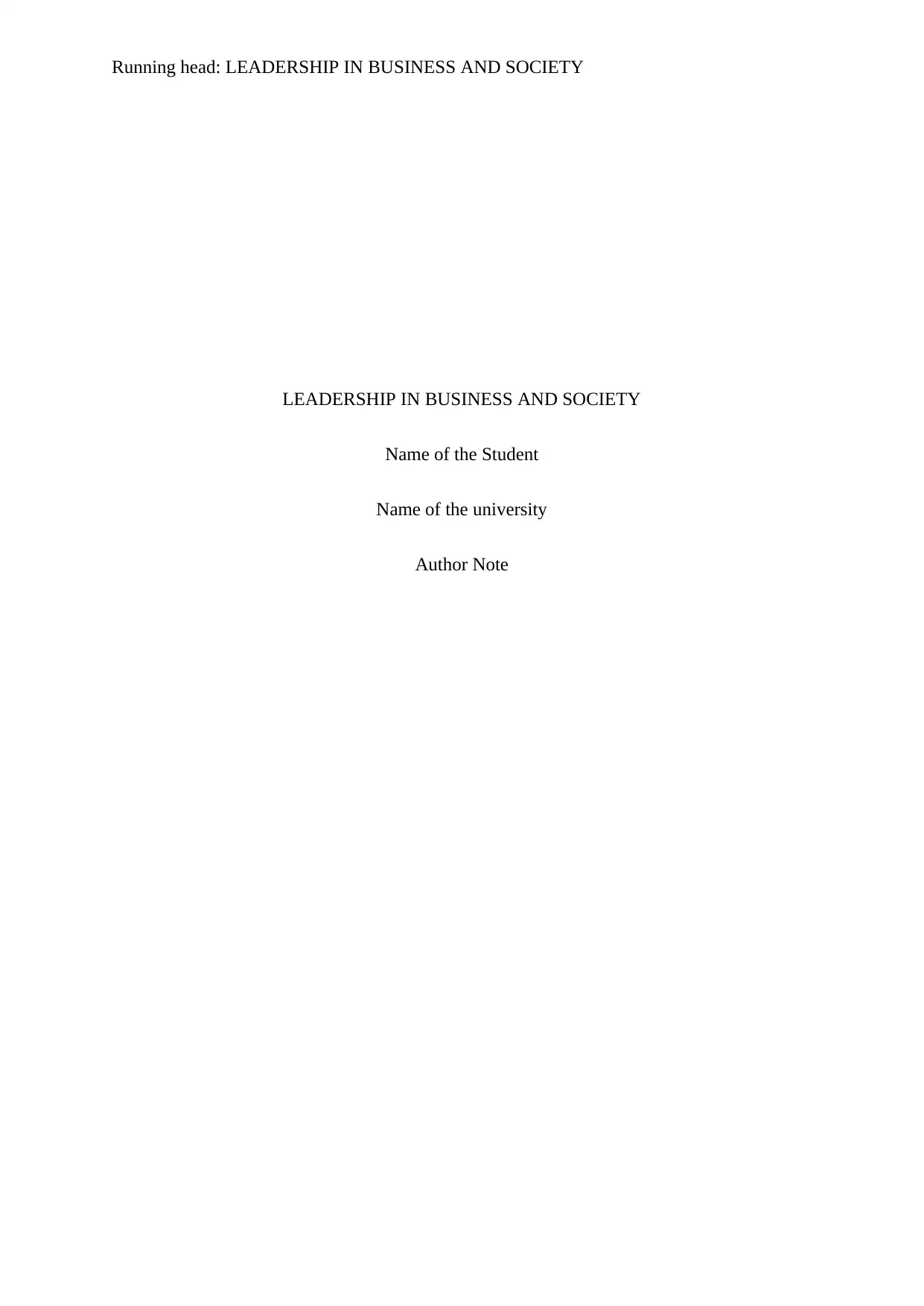
Running head: LEADERSHIP IN BUSINESS AND SOCIETY
LEADERSHIP IN BUSINESS AND SOCIETY
Name of the Student
Name of the university
Author Note
LEADERSHIP IN BUSINESS AND SOCIETY
Name of the Student
Name of the university
Author Note
Paraphrase This Document
Need a fresh take? Get an instant paraphrase of this document with our AI Paraphraser
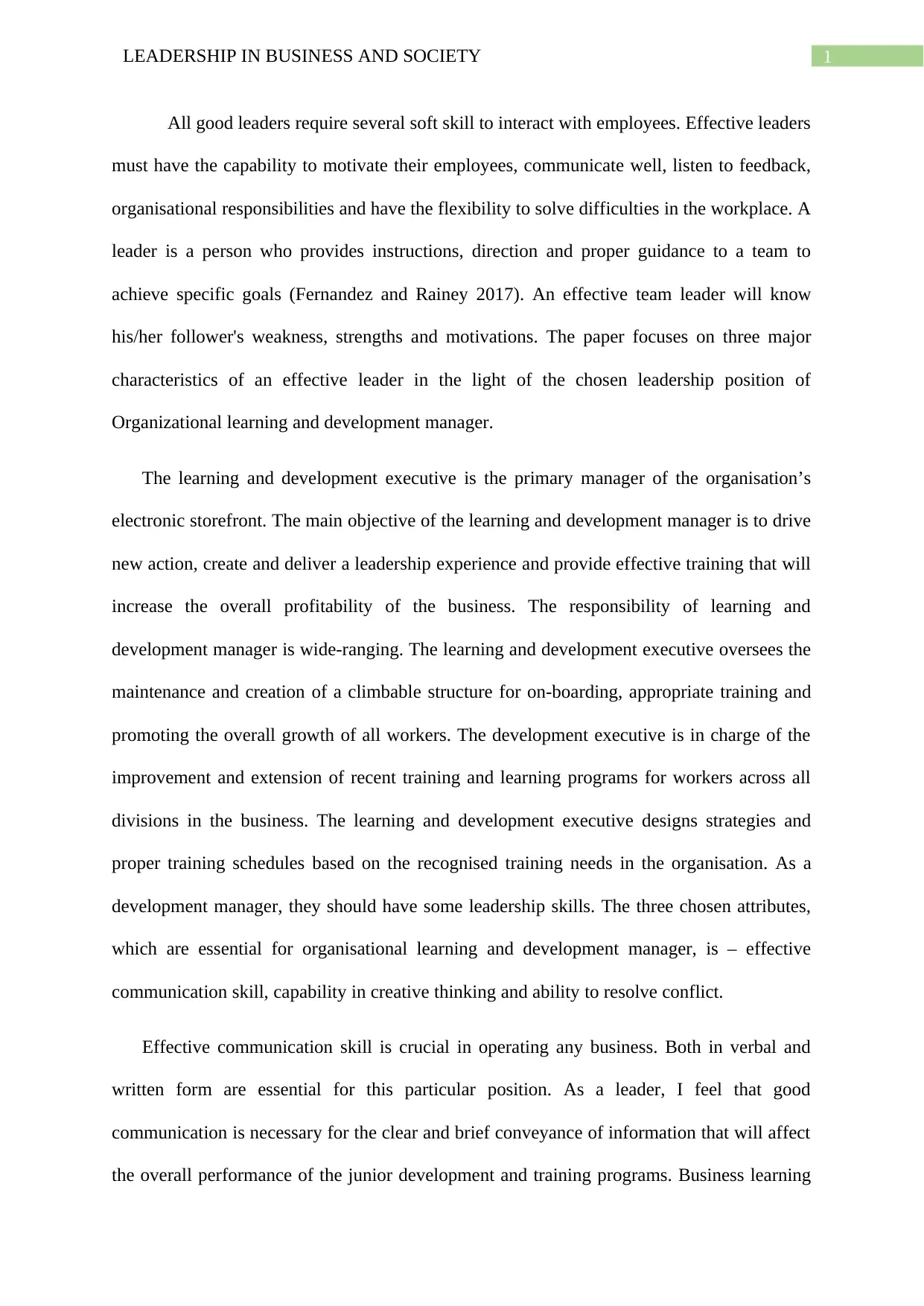
1LEADERSHIP IN BUSINESS AND SOCIETY
All good leaders require several soft skill to interact with employees. Effective leaders
must have the capability to motivate their employees, communicate well, listen to feedback,
organisational responsibilities and have the flexibility to solve difficulties in the workplace. A
leader is a person who provides instructions, direction and proper guidance to a team to
achieve specific goals (Fernandez and Rainey 2017). An effective team leader will know
his/her follower's weakness, strengths and motivations. The paper focuses on three major
characteristics of an effective leader in the light of the chosen leadership position of
Organizational learning and development manager.
The learning and development executive is the primary manager of the organisation’s
electronic storefront. The main objective of the learning and development manager is to drive
new action, create and deliver a leadership experience and provide effective training that will
increase the overall profitability of the business. The responsibility of learning and
development manager is wide-ranging. The learning and development executive oversees the
maintenance and creation of a climbable structure for on-boarding, appropriate training and
promoting the overall growth of all workers. The development executive is in charge of the
improvement and extension of recent training and learning programs for workers across all
divisions in the business. The learning and development executive designs strategies and
proper training schedules based on the recognised training needs in the organisation. As a
development manager, they should have some leadership skills. The three chosen attributes,
which are essential for organisational learning and development manager, is – effective
communication skill, capability in creative thinking and ability to resolve conflict.
Effective communication skill is crucial in operating any business. Both in verbal and
written form are essential for this particular position. As a leader, I feel that good
communication is necessary for the clear and brief conveyance of information that will affect
the overall performance of the junior development and training programs. Business learning
All good leaders require several soft skill to interact with employees. Effective leaders
must have the capability to motivate their employees, communicate well, listen to feedback,
organisational responsibilities and have the flexibility to solve difficulties in the workplace. A
leader is a person who provides instructions, direction and proper guidance to a team to
achieve specific goals (Fernandez and Rainey 2017). An effective team leader will know
his/her follower's weakness, strengths and motivations. The paper focuses on three major
characteristics of an effective leader in the light of the chosen leadership position of
Organizational learning and development manager.
The learning and development executive is the primary manager of the organisation’s
electronic storefront. The main objective of the learning and development manager is to drive
new action, create and deliver a leadership experience and provide effective training that will
increase the overall profitability of the business. The responsibility of learning and
development manager is wide-ranging. The learning and development executive oversees the
maintenance and creation of a climbable structure for on-boarding, appropriate training and
promoting the overall growth of all workers. The development executive is in charge of the
improvement and extension of recent training and learning programs for workers across all
divisions in the business. The learning and development executive designs strategies and
proper training schedules based on the recognised training needs in the organisation. As a
development manager, they should have some leadership skills. The three chosen attributes,
which are essential for organisational learning and development manager, is – effective
communication skill, capability in creative thinking and ability to resolve conflict.
Effective communication skill is crucial in operating any business. Both in verbal and
written form are essential for this particular position. As a leader, I feel that good
communication is necessary for the clear and brief conveyance of information that will affect
the overall performance of the junior development and training programs. Business learning
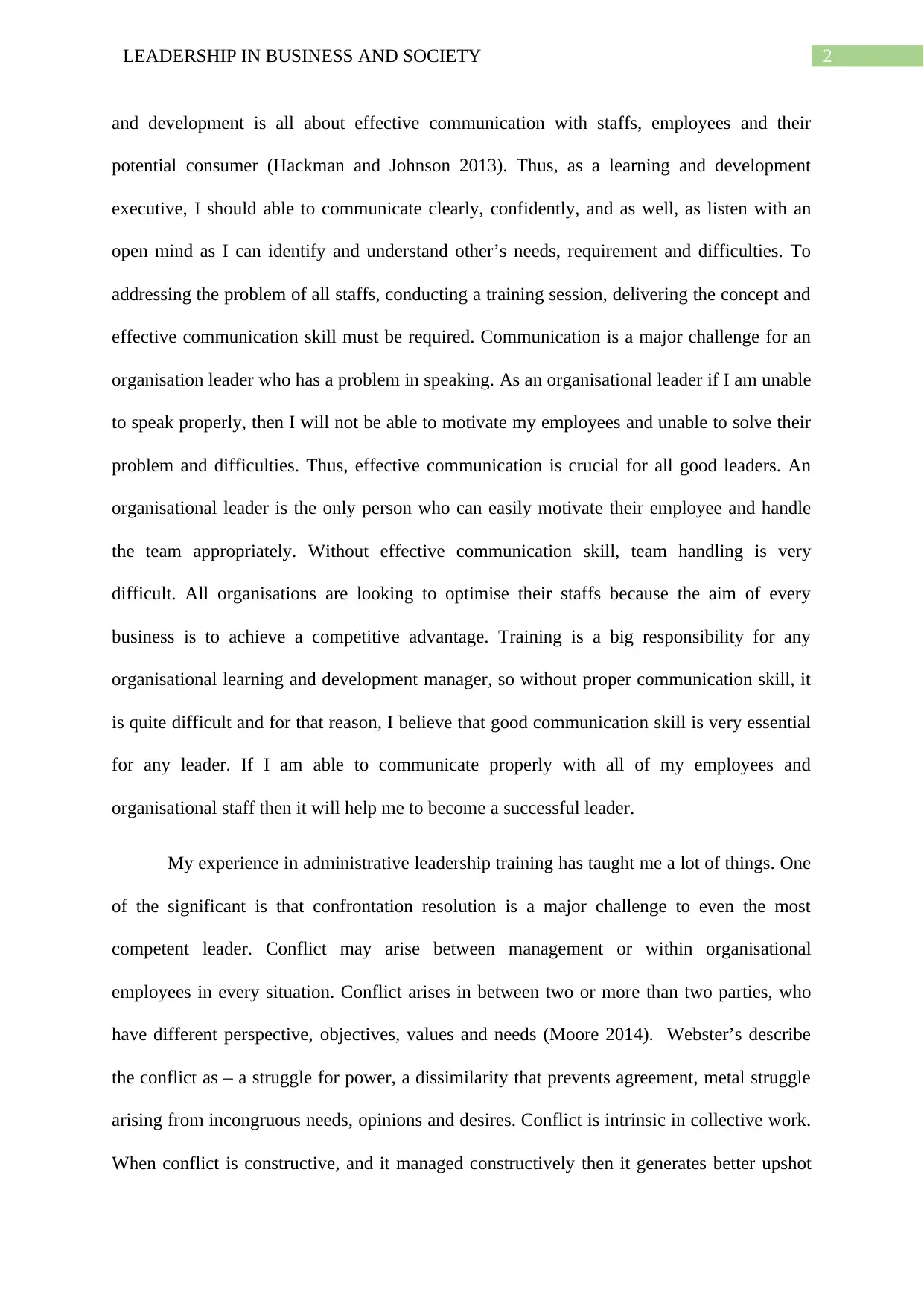
2LEADERSHIP IN BUSINESS AND SOCIETY
and development is all about effective communication with staffs, employees and their
potential consumer (Hackman and Johnson 2013). Thus, as a learning and development
executive, I should able to communicate clearly, confidently, and as well, as listen with an
open mind as I can identify and understand other’s needs, requirement and difficulties. To
addressing the problem of all staffs, conducting a training session, delivering the concept and
effective communication skill must be required. Communication is a major challenge for an
organisation leader who has a problem in speaking. As an organisational leader if I am unable
to speak properly, then I will not be able to motivate my employees and unable to solve their
problem and difficulties. Thus, effective communication is crucial for all good leaders. An
organisational leader is the only person who can easily motivate their employee and handle
the team appropriately. Without effective communication skill, team handling is very
difficult. All organisations are looking to optimise their staffs because the aim of every
business is to achieve a competitive advantage. Training is a big responsibility for any
organisational learning and development manager, so without proper communication skill, it
is quite difficult and for that reason, I believe that good communication skill is very essential
for any leader. If I am able to communicate properly with all of my employees and
organisational staff then it will help me to become a successful leader.
My experience in administrative leadership training has taught me a lot of things. One
of the significant is that confrontation resolution is a major challenge to even the most
competent leader. Conflict may arise between management or within organisational
employees in every situation. Conflict arises in between two or more than two parties, who
have different perspective, objectives, values and needs (Moore 2014). Webster’s describe
the conflict as – a struggle for power, a dissimilarity that prevents agreement, metal struggle
arising from incongruous needs, opinions and desires. Conflict is intrinsic in collective work.
When conflict is constructive, and it managed constructively then it generates better upshot
and development is all about effective communication with staffs, employees and their
potential consumer (Hackman and Johnson 2013). Thus, as a learning and development
executive, I should able to communicate clearly, confidently, and as well, as listen with an
open mind as I can identify and understand other’s needs, requirement and difficulties. To
addressing the problem of all staffs, conducting a training session, delivering the concept and
effective communication skill must be required. Communication is a major challenge for an
organisation leader who has a problem in speaking. As an organisational leader if I am unable
to speak properly, then I will not be able to motivate my employees and unable to solve their
problem and difficulties. Thus, effective communication is crucial for all good leaders. An
organisational leader is the only person who can easily motivate their employee and handle
the team appropriately. Without effective communication skill, team handling is very
difficult. All organisations are looking to optimise their staffs because the aim of every
business is to achieve a competitive advantage. Training is a big responsibility for any
organisational learning and development manager, so without proper communication skill, it
is quite difficult and for that reason, I believe that good communication skill is very essential
for any leader. If I am able to communicate properly with all of my employees and
organisational staff then it will help me to become a successful leader.
My experience in administrative leadership training has taught me a lot of things. One
of the significant is that confrontation resolution is a major challenge to even the most
competent leader. Conflict may arise between management or within organisational
employees in every situation. Conflict arises in between two or more than two parties, who
have different perspective, objectives, values and needs (Moore 2014). Webster’s describe
the conflict as – a struggle for power, a dissimilarity that prevents agreement, metal struggle
arising from incongruous needs, opinions and desires. Conflict is intrinsic in collective work.
When conflict is constructive, and it managed constructively then it generates better upshot
⊘ This is a preview!⊘
Do you want full access?
Subscribe today to unlock all pages.

Trusted by 1+ million students worldwide
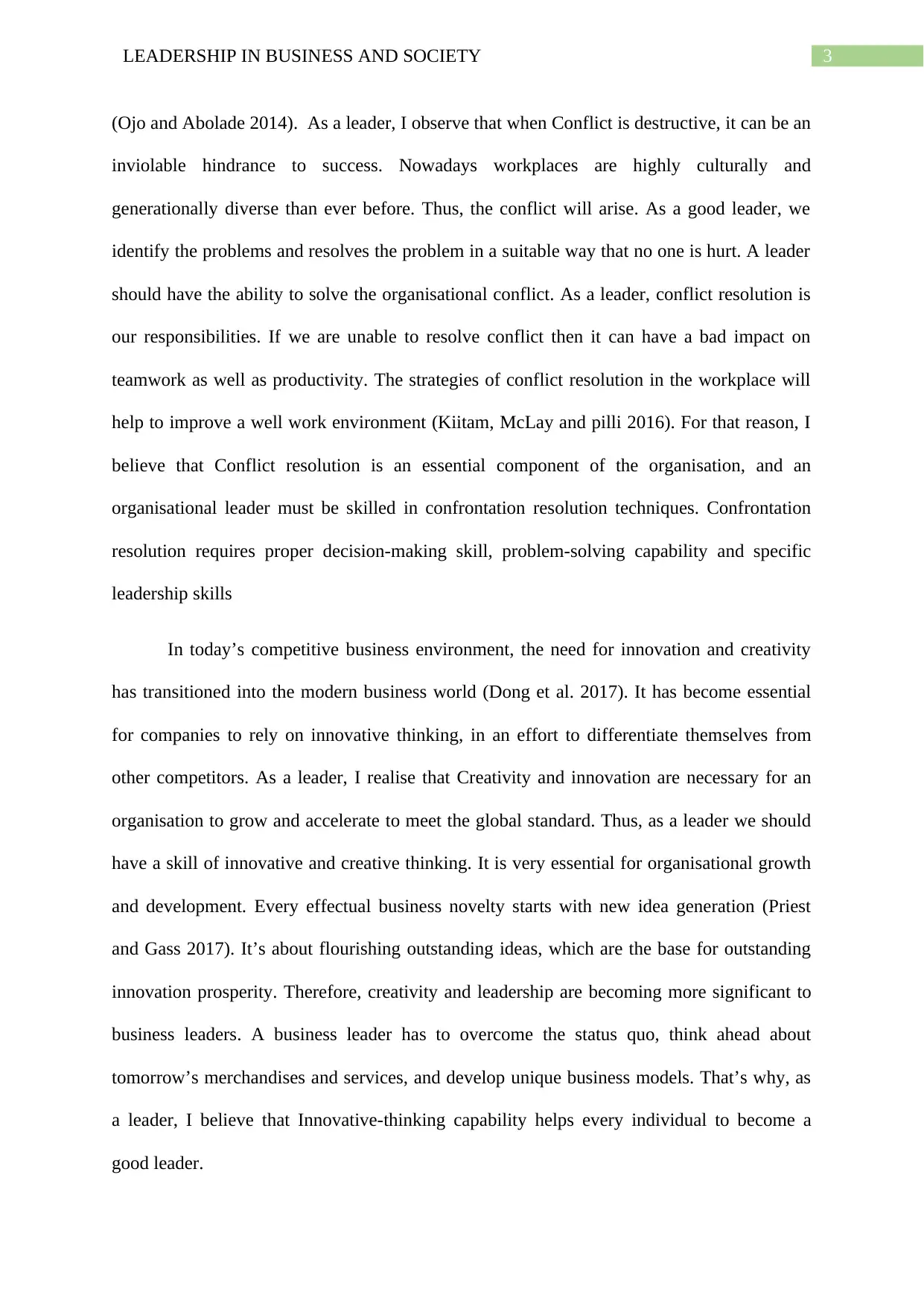
3LEADERSHIP IN BUSINESS AND SOCIETY
(Ojo and Abolade 2014). As a leader, I observe that when Conflict is destructive, it can be an
inviolable hindrance to success. Nowadays workplaces are highly culturally and
generationally diverse than ever before. Thus, the conflict will arise. As a good leader, we
identify the problems and resolves the problem in a suitable way that no one is hurt. A leader
should have the ability to solve the organisational conflict. As a leader, conflict resolution is
our responsibilities. If we are unable to resolve conflict then it can have a bad impact on
teamwork as well as productivity. The strategies of conflict resolution in the workplace will
help to improve a well work environment (Kiitam, McLay and pilli 2016). For that reason, I
believe that Conflict resolution is an essential component of the organisation, and an
organisational leader must be skilled in confrontation resolution techniques. Confrontation
resolution requires proper decision-making skill, problem-solving capability and specific
leadership skills
In today’s competitive business environment, the need for innovation and creativity
has transitioned into the modern business world (Dong et al. 2017). It has become essential
for companies to rely on innovative thinking, in an effort to differentiate themselves from
other competitors. As a leader, I realise that Creativity and innovation are necessary for an
organisation to grow and accelerate to meet the global standard. Thus, as a leader we should
have a skill of innovative and creative thinking. It is very essential for organisational growth
and development. Every effectual business novelty starts with new idea generation (Priest
and Gass 2017). It’s about flourishing outstanding ideas, which are the base for outstanding
innovation prosperity. Therefore, creativity and leadership are becoming more significant to
business leaders. A business leader has to overcome the status quo, think ahead about
tomorrow’s merchandises and services, and develop unique business models. That’s why, as
a leader, I believe that Innovative-thinking capability helps every individual to become a
good leader.
(Ojo and Abolade 2014). As a leader, I observe that when Conflict is destructive, it can be an
inviolable hindrance to success. Nowadays workplaces are highly culturally and
generationally diverse than ever before. Thus, the conflict will arise. As a good leader, we
identify the problems and resolves the problem in a suitable way that no one is hurt. A leader
should have the ability to solve the organisational conflict. As a leader, conflict resolution is
our responsibilities. If we are unable to resolve conflict then it can have a bad impact on
teamwork as well as productivity. The strategies of conflict resolution in the workplace will
help to improve a well work environment (Kiitam, McLay and pilli 2016). For that reason, I
believe that Conflict resolution is an essential component of the organisation, and an
organisational leader must be skilled in confrontation resolution techniques. Confrontation
resolution requires proper decision-making skill, problem-solving capability and specific
leadership skills
In today’s competitive business environment, the need for innovation and creativity
has transitioned into the modern business world (Dong et al. 2017). It has become essential
for companies to rely on innovative thinking, in an effort to differentiate themselves from
other competitors. As a leader, I realise that Creativity and innovation are necessary for an
organisation to grow and accelerate to meet the global standard. Thus, as a leader we should
have a skill of innovative and creative thinking. It is very essential for organisational growth
and development. Every effectual business novelty starts with new idea generation (Priest
and Gass 2017). It’s about flourishing outstanding ideas, which are the base for outstanding
innovation prosperity. Therefore, creativity and leadership are becoming more significant to
business leaders. A business leader has to overcome the status quo, think ahead about
tomorrow’s merchandises and services, and develop unique business models. That’s why, as
a leader, I believe that Innovative-thinking capability helps every individual to become a
good leader.
Paraphrase This Document
Need a fresh take? Get an instant paraphrase of this document with our AI Paraphraser
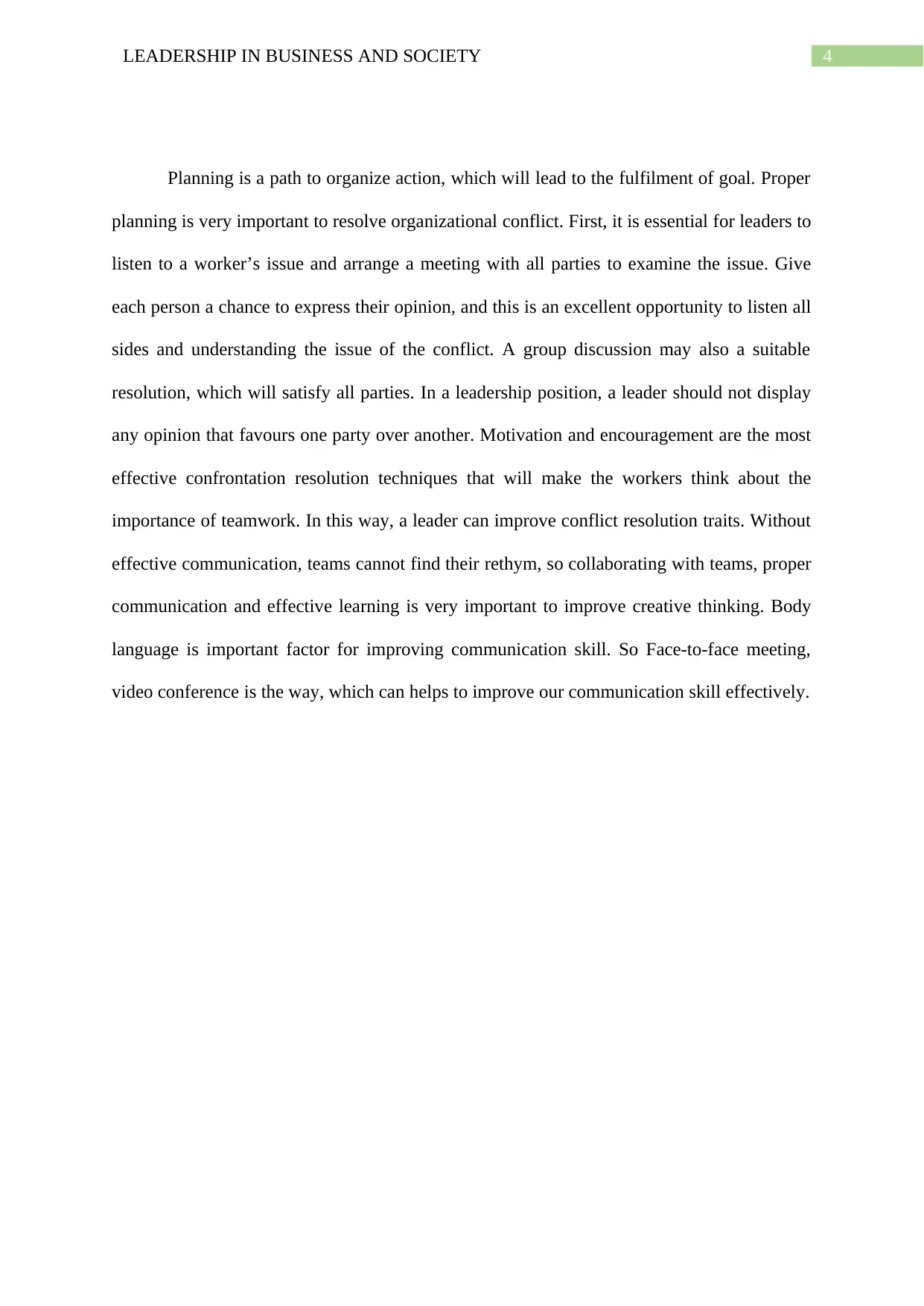
4LEADERSHIP IN BUSINESS AND SOCIETY
Planning is a path to organize action, which will lead to the fulfilment of goal. Proper
planning is very important to resolve organizational conflict. First, it is essential for leaders to
listen to a worker’s issue and arrange a meeting with all parties to examine the issue. Give
each person a chance to express their opinion, and this is an excellent opportunity to listen all
sides and understanding the issue of the conflict. A group discussion may also a suitable
resolution, which will satisfy all parties. In a leadership position, a leader should not display
any opinion that favours one party over another. Motivation and encouragement are the most
effective confrontation resolution techniques that will make the workers think about the
importance of teamwork. In this way, a leader can improve conflict resolution traits. Without
effective communication, teams cannot find their rethym, so collaborating with teams, proper
communication and effective learning is very important to improve creative thinking. Body
language is important factor for improving communication skill. So Face-to-face meeting,
video conference is the way, which can helps to improve our communication skill effectively.
Planning is a path to organize action, which will lead to the fulfilment of goal. Proper
planning is very important to resolve organizational conflict. First, it is essential for leaders to
listen to a worker’s issue and arrange a meeting with all parties to examine the issue. Give
each person a chance to express their opinion, and this is an excellent opportunity to listen all
sides and understanding the issue of the conflict. A group discussion may also a suitable
resolution, which will satisfy all parties. In a leadership position, a leader should not display
any opinion that favours one party over another. Motivation and encouragement are the most
effective confrontation resolution techniques that will make the workers think about the
importance of teamwork. In this way, a leader can improve conflict resolution traits. Without
effective communication, teams cannot find their rethym, so collaborating with teams, proper
communication and effective learning is very important to improve creative thinking. Body
language is important factor for improving communication skill. So Face-to-face meeting,
video conference is the way, which can helps to improve our communication skill effectively.
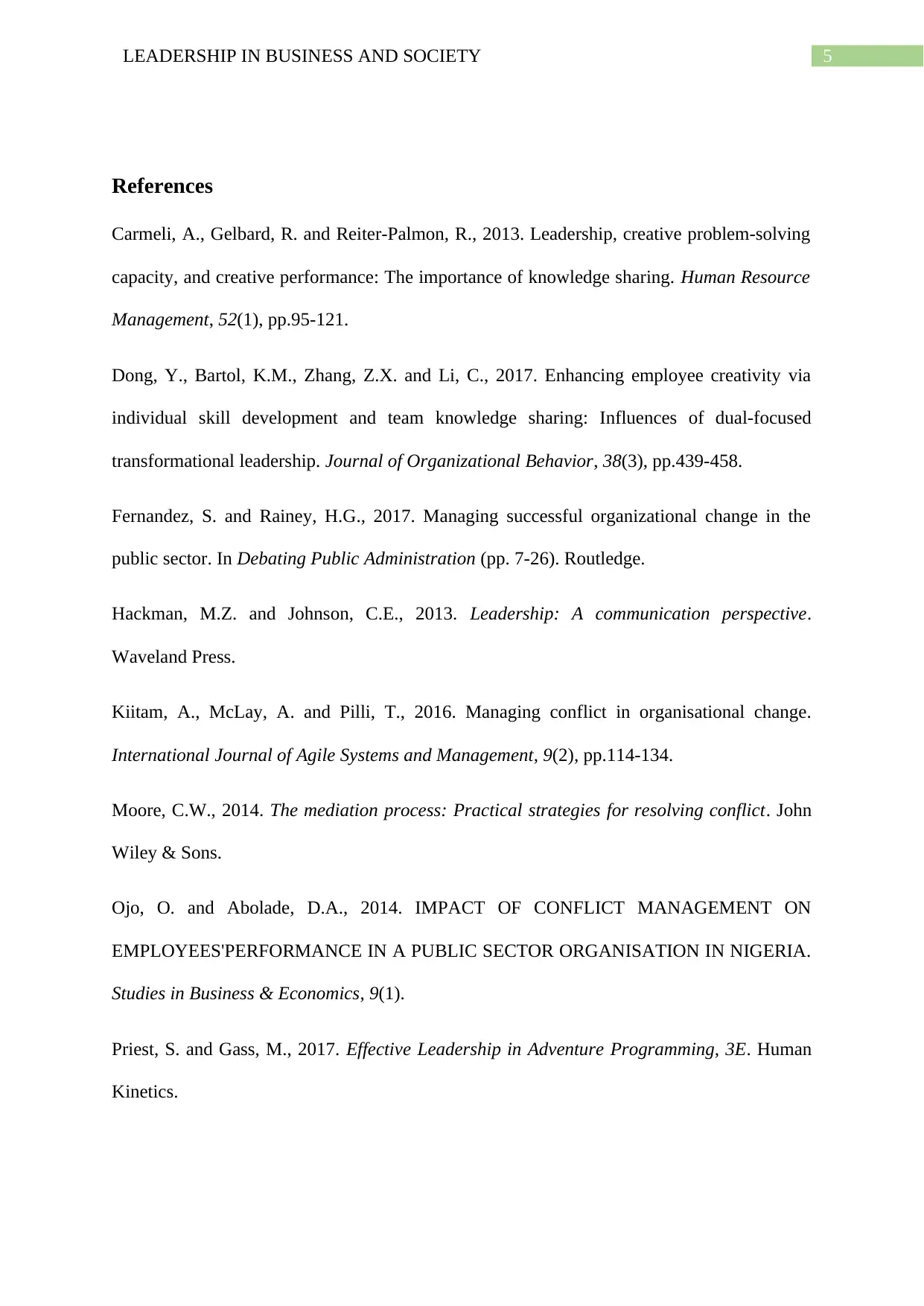
5LEADERSHIP IN BUSINESS AND SOCIETY
References
Carmeli, A., Gelbard, R. and Reiter‐Palmon, R., 2013. Leadership, creative problem‐solving
capacity, and creative performance: The importance of knowledge sharing. Human Resource
Management, 52(1), pp.95-121.
Dong, Y., Bartol, K.M., Zhang, Z.X. and Li, C., 2017. Enhancing employee creativity via
individual skill development and team knowledge sharing: Influences of dual‐focused
transformational leadership. Journal of Organizational Behavior, 38(3), pp.439-458.
Fernandez, S. and Rainey, H.G., 2017. Managing successful organizational change in the
public sector. In Debating Public Administration (pp. 7-26). Routledge.
Hackman, M.Z. and Johnson, C.E., 2013. Leadership: A communication perspective.
Waveland Press.
Kiitam, A., McLay, A. and Pilli, T., 2016. Managing conflict in organisational change.
International Journal of Agile Systems and Management, 9(2), pp.114-134.
Moore, C.W., 2014. The mediation process: Practical strategies for resolving conflict. John
Wiley & Sons.
Ojo, O. and Abolade, D.A., 2014. IMPACT OF CONFLICT MANAGEMENT ON
EMPLOYEES'PERFORMANCE IN A PUBLIC SECTOR ORGANISATION IN NIGERIA.
Studies in Business & Economics, 9(1).
Priest, S. and Gass, M., 2017. Effective Leadership in Adventure Programming, 3E. Human
Kinetics.
References
Carmeli, A., Gelbard, R. and Reiter‐Palmon, R., 2013. Leadership, creative problem‐solving
capacity, and creative performance: The importance of knowledge sharing. Human Resource
Management, 52(1), pp.95-121.
Dong, Y., Bartol, K.M., Zhang, Z.X. and Li, C., 2017. Enhancing employee creativity via
individual skill development and team knowledge sharing: Influences of dual‐focused
transformational leadership. Journal of Organizational Behavior, 38(3), pp.439-458.
Fernandez, S. and Rainey, H.G., 2017. Managing successful organizational change in the
public sector. In Debating Public Administration (pp. 7-26). Routledge.
Hackman, M.Z. and Johnson, C.E., 2013. Leadership: A communication perspective.
Waveland Press.
Kiitam, A., McLay, A. and Pilli, T., 2016. Managing conflict in organisational change.
International Journal of Agile Systems and Management, 9(2), pp.114-134.
Moore, C.W., 2014. The mediation process: Practical strategies for resolving conflict. John
Wiley & Sons.
Ojo, O. and Abolade, D.A., 2014. IMPACT OF CONFLICT MANAGEMENT ON
EMPLOYEES'PERFORMANCE IN A PUBLIC SECTOR ORGANISATION IN NIGERIA.
Studies in Business & Economics, 9(1).
Priest, S. and Gass, M., 2017. Effective Leadership in Adventure Programming, 3E. Human
Kinetics.
⊘ This is a preview!⊘
Do you want full access?
Subscribe today to unlock all pages.

Trusted by 1+ million students worldwide
1 out of 6
Related Documents
Your All-in-One AI-Powered Toolkit for Academic Success.
+13062052269
info@desklib.com
Available 24*7 on WhatsApp / Email
![[object Object]](/_next/static/media/star-bottom.7253800d.svg)
Unlock your academic potential
Copyright © 2020–2026 A2Z Services. All Rights Reserved. Developed and managed by ZUCOL.





